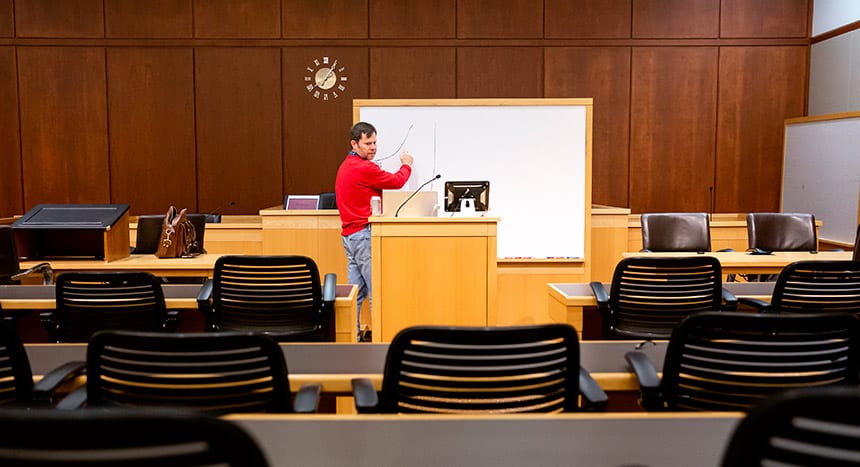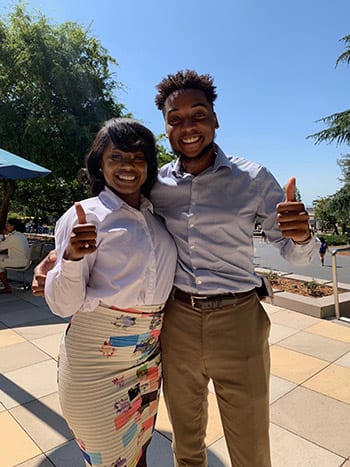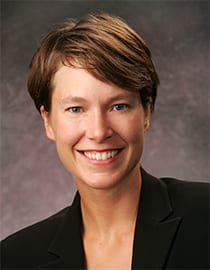
By Gwyneth K. Shaw
The hallways, courtyards, classrooms, and offices of Berkeley Law have been empty for months, with students, faculty, and staff spread out around the state, the nation, and the world. The COVID-19 pandemic gripping the globe has created an enormous disruption, canceling event after event, including commencement and even some states’ bar exams.
Yet the school’s close-knit community continues to thrive — learning, working, and connecting remotely. With a virtual fall semester on the horizon, the lessons learned from the sudden pivot this spring are being applied to a fresh slate of online courses.
“I think both faculty and staff are pleasantly surprised with how well the transition has been going,” says Professor Molly Van Houweling, the school’s associate dean overseeing the J.D. curriculum and teaching. “I attribute that to a lot of hard work and flexibility on everyone’s part, and the sense of mission and community that this crisis has reinforced for all of us.”
That sense was immediate when classes began meeting over Zoom March 10. The school — and entire UC Berkeley campus — closed six days later. As it became clear the shutdown would extend through the spring semester, calls went out for donations to support community members facing sudden hardship, including students, law school staff, and employees of the iconic Café Zeb.
Tip sheets began circulating, covering a broad swath of needs: Where to find food, virtual learning help, online workout ideas, Netflix recommendations, and on and on. Students with cars and bikes offered to help run errands and deliver groceries. The school’s Pro Bono Program became a clearinghouse for matching students with organizations that needed pandemic-related legal help.
“I was incredibly moved by students’ compassion towards staff, faculty, and one another at the end of the spring semester,” says Kyle Valenti, senior director in the Student Services Office. “Despite how difficult the transition to going online was for everyone, I could sense how grateful everyone was to be a part of the Berkeley Law community. And I think that’s because everyone was confident that we were all looking out for one another.”
Challenges, with bright spots

Justin Brooks ’21 and Linda Blair ’21, who led the Student Association at Berkeley Law (SABL) during the academic year, say students faced heavy challenges. The transition to online classes went well, Brooks says, but it was hard to maintain focus with new developments unfolding constantly.
SABL leaders increased communications with the student body to keep everyone informed, and gave what was left of the group’s annual budget to the fund for affected students. Informally, students are constantly devising ways to stay connected, from Zoom concerts to old-fashioned phone calls.
“I have heard countless stories about how students are fostering community during this time, including virtual parties and weekly check-ins,” Brooks says. “Wherever we are, we’re still Berkeley Law and we will make it through this.”
Blair praised Dean Erwin Chemerinsky and the school’s administration for listening to and supporting students on important issues, including spring semester grading, which was changed to credit/no credit. Chemerinsky has also been a strong advocate for postponing or canceling bar exams, and instead giving recent graduates diploma privilege or other alternatives to sitting for the bar during the pandemic.
“Students have worked hard to make their voices heard. Dean Chemerinsky and the entire administration has equally worked hard to understand these positions and execute them in a way that the community can understand and appreciate,” Blair says. “Our community here is one of a kind, and we are grateful to be at an institution and within a community that cares to listen and dares to change.”
Setting the school apart
After the law school closed, one of the first hurdles to clear was how to convert Admitted Students Weekend into a virtual event while offering a crucial glimpse into life on campus. The Admissions Office created a web portal for admitted students with online events over eight days, drawing in students, faculty, administrators, and alumni for formal and casual events and conversations.
“Some of the lows are having to cancel or postpone — importantly and rightly so — many of the wonderful events that help breathe life into this community, including commencement, Bearrister’s Ball, and a number of student group symposia and conferences,” Blair says. “The cancellation of Admitted Students Weekend was a bummer for all involved, especially our students who worked on planning activities for months, and our admits, who were not able to get the in-person experience that solidified my decision to attend.
“Thankfully, the administration, together with our wonderful students, put on a virtual experience for admits that gave them insight into life here.”
As commencement approached shortly afterward, a student survey found most wanted to wait for an in-person ceremony — hopefully in the spring of 2021 — but still wanted to mark the occasion somehow. A website for graduates collected speeches from students, faculty, and the keynote speaker, U.S. District Judge Edward Chen ’79. The site also features a collection of video tributes from family and friends, photos of the graduates, and the winners of the school’s annual awards.
Graduating LL.M. students will get their own virtual commencement in August.
Forging ahead
Throughout the spring and summer, a robust slate of virtual events has continued, many addressing the multifaceted challenges of the pandemic, the growing national reckoning around the Black Lives Matter movement, or both.
More than 80 LL.M. students on the professional and hybrid tracks began their course work in May. And as the all-online fall semester grows closer, planning is in high gear.
In the spring, the school’s instructional technology staff helped faculty transition their courses to the Zoom format. There were creative workarounds, especially for interactive classes.
Daralyn Durie ’92, a founding partner at Durie Tangri in San Francisco, stepped in to help with the Civil Trial Practice class taught by California Court of Appeal Associate Justice Tracie Brown ’96 and U.S. District Judge Jeffrey White. Durie offered extra mentoring to help make up for students missing out on the courtroom practice they would usually get.

Van Houweling offers another glimpse into the ways virtual learning can improve on the in-person experience: Using Zoom’s breakout rooms to replicate her frequent request that students turn to a neighbor to talk about a case or problem before a full class discussion, she grouped students with a random set of classmates each time, instead of the people they sit next to every day.
“So they report that they’ve gotten to know classmates they had never talked to before,” she says.
“As much as we all miss the community-building aspects of our in-person interactions, there are a few things like this that have enhanced our community in unexpected ways.”
Now, the task is to prepare for a full semester delivered virtually, including an additional lineup of small, one-credit classes just for 1Ls, to promote camaraderie among new students and the faculty.
“I was so tremendously impressed by how quickly — with just a day’s notice — our faculty, staff, and students shifted to remote instruction. I have no doubt with much more time to plan for it will be even better for the fall semester,” says Chemerinsky, who pushed to create the courses, which are capped at a maximum of 11 students.
To help 1Ls make the unprecedented transition into law school online, Valenti’s office is planning virtual programs with building affinity among the new students as their sole purpose.
“We are committed to maintaining, and strengthening, the Berkeley Law community,” he says.